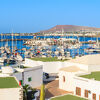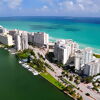25 Nights | ATLANTIC AWAKENING
You will visit the following 11 places:

Tenerife

Punta Cana
Punta Cana is part of the newly created Punta Cana-Bávaro-Veron-Macao municipal district in La Altagracia, the easternmost province of the Dominican Republic. The area is best known for its beaches and balnearios, which face both the Caribbean and Atlantic, and it has been a popular tourist destination since the 1970s. The Punta Cana area has an estimated population of 100,000 with a growth rate of 6%. To the north, it borders the village and beach of Cabeza de Toro, and then the Bávaro and El Cortecito beaches. The nearest city, the 500-year-old capital of the Province Higüey, is 45 kilometres (28 mi) away, and it takes about an hour to drive there. Europeans, particularly Spanish hotel chains, own all but two of the 50+ megaresorts of the Punta Cana tourism destination.

Lisbon
The capital of Portugal, Lisbon (Portuguese: Lisboa) has experienced a renaissance in recent years, with a contemporary culture that is alive and thriving and making its mark in today's Europe. Perched on the edge of the Atlantic Ocean, Lisbon is one of the rare Western European cities that faces the ocean and uses water as an element that defines the city. Lisbon enchants travellers with its white-bleached limestone buildings, intimate alleyways, and an easy-going charm that makes it a popular year-round destination.

Funchal
Funchal is the largest city, the municipal seat and the capital of Portugal's Autonomous Region of Madeira. The city has a population of 111,892, making it the 6th largest city in Portugal, and has been the capital of Madeira for more than five centuries. Because of its high cultural and historical value, Funchal is one of Portugal's main tourist attractions. It is also popular as a destination for New Year's Eve, and it is the leading Portuguese port on cruise liner dockings.

Lanzarote
Lanzarote, a Spanish island, is the easternmost of the autonomous Canary Islands, in the Atlantic Ocean. Covering 845.94 square kilometers (327 sq mi), it is the fourth largest of the islands in the archipelago. With 141,938 inhabitants, Lanzarote is the third most populous island of the Canary Islands, after Tenerife and Gran Canaria. In the center-west of the island is the Timanfaya National Park, which is one of the main attractions of Lanzarote. Its capital is Arrecife.

Havana
Havana, officially Ciudad de La Habana, is the capital city, major port, and leading commercial centre of Cuba. The city is one of the 15 Cuban provinces. The city/province has 2.1 million inhabitants, the largest city in Cuba and the second largest in the Caribbean region, after Santo Domingo. The city extends mostly westward and southward from the bay, which is entered through a narrow inlet and which divides into three main harbours: Marimelena, Guanabacoa, and Atarés. The sluggish Almendares River traverses the city from south to north, entering the Straits of Florida a few miles west of the bay.

Miami
Miami is a major city located on the Atlantic coast in southeastern Florida and the county seat of Miami-Dade County, the most populous county in Florida and the eighth-most populous county in the United States with a population of 2,500,625. The 42nd largest city in the United States, with a population of 433,136, it is the principal, central, and most populous city of the South {Florida} metropolitan area, the most populous metropolis in the Southeastern United States. According to the US Census Bureau, Miami's metro area is the seventh most populous in the United States, with an estimated population of 5,547,051 in 2009.

Santiago de Cuba
Santiago de Cuba is the capital of the Santiago de Cuba province in south-eastern Cuba. Historically Santiago de Cuba has long been the second most important city on the island after Havana, and still remains the second largest. It is on a bay connected to the Caribbean Sea and is an important sea port. The city best known for colonial architecture and revolutionary history.

Cienfuegos
Cienfuegos is a stunning waterfront city situated on the southern coast of Cuba. Its picturesque nautical setting has earned it the title, “the Pearl of the South”, a description that has endured for centuries. The history of Cienfuegos possesses interesting antecedents and is rich in aborigine and Hispanic legends. Founded in 1819, it's one of Cuba's newest settlements, but also one of its most architecturally interesting, a factor that earned it a Unesco World Heritage Site listing in 2005.

Great Stirrup Cay
Great Stirrup Cay is a small island that is part of the Berry Islands in the Bahamas. Norwegian Cruise Line purchased the island from the Belcher Oil Company in 1977 and developed it into a private island for their cruise ship passengers. The northern part of the island has a sandy beach surrounded by rocks with snorkeling areas. The southern part features a helicopter airfield (with a sign reading "Great Stirrup Cay International Airport"), a large area without vegetation, and numerous concrete blocks. These are all remnants of a previous U.S. military installation and satellite tracking station. The island's lighthouse was originally constructed in 1863 by the Imperial Lighthouse Service. Great Stirrup Cay is adjacent to Little Stirrup Cay, Royal Caribbean Cruises' private island.










